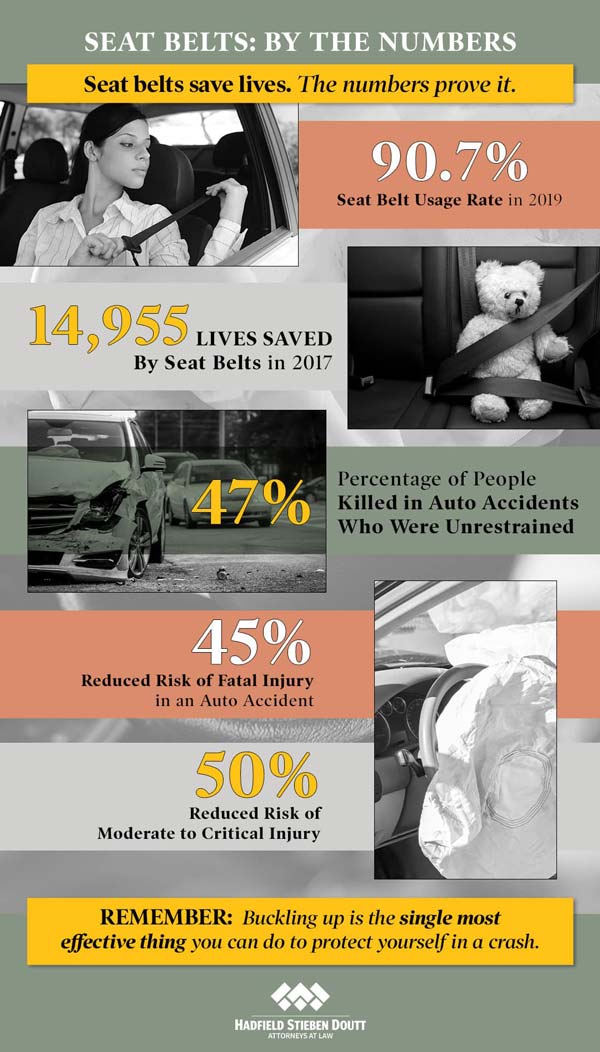Driving is a dangerous activity. Each year there are tens of thousands of people in the U.S. alone who are killed or seriously injured in motor vehicle accidents. Despite this, you may or may not be surprised to learn that the number of deadly accidents and wrongful death claims has dropped over time. The likeliest reason for this decrease is because of all sorts of added safety features in our vehicles. The seat belt is one of these features. According to the National Highway Traffic Safety Administration (NHTSA), about half the people killed in motor vehicle crashes each year were not wearing safety restraints. It stands to reason that a large number of these deaths would have been prevented if seat belts had been worn. Indeed, in 2017, 37,133 people died in motor vehicle accidents in the U.S. and of that number, an estimated 14,955 lives could have been saved by wearing seat belts.
With this in mind, we wanted to take a look at the seat belt laws right here in Colorado. It’s important to know these laws so that you can stay safe and protect others on the road as well. If you have any questions, be sure to contact our team of car accident lawyers in Fort Collins. You can schedule a consultation with us today. In the meantime, let’s take a look at the Colorado seat belt laws.
Colorado Seat Belt Safety Laws
Seat belt laws vary from state to state. Many states require that every passenger in the vehicle, regardless of their age, wear a seat belt at all times. Colorado is an exception here. Rather than requiring that all passengers wear a seat belt at all times, it is only required of the occupants in the front seat to wear their seat belt, provided they are over the age of 15.
According to the Colorado General Assembly, Colorado law requires the driver and every front seat passenger of a motor vehicle to wear a seat belt whenever the vehicle is operated on a street or highway. Colorado’s child restraint law requires that children 15 years old and younger riding in a vehicle be properly secured regardless of seating position. There are important exceptions to this rule, however. People who are diagnosed with psychological or physical conditions that prevent them from wearing seat belts or safety restraints are exempt from this law. On top of that, many vehicles don’t even come equipped with seat belts. School buses are an example. These, too, are exceptions to the standard seat belt law. However, if you are in a situation that is subject to Colorado seat belt law, then what kind of penalties might you incur if you fail to follow it?

Penalties for Failing to Follow Seat Belt Laws
In Colorado, failure to wear a seat belt is considered a secondary offense. What this means is that drivers will not be cited for failure to wear seat belts as the only offense. A citation will only occur if the driver is stopped by a law enforcement officer for an alleged violation of another law. If this does happen, then the driver has committed a Class B traffic infraction and is subject to a $65 fine and a $6 surcharge. You can contact our team of car accident lawyers in Fort Collins if you have questions about this law or want to dispute a citation.
Preventing Injuries With Seat Belts
Seat belts are necessary for the prevention of serious injuries in motor vehicle crashes. Vehicle accidents are the number one cause of death for people under the age of 34. One of the most severe injuries possible is a traumatic brain injury, which can occur when the head hits the windshield. Wearing a seat belt will prevent your body from being ejected from the vehicle in an accident. A person wearing a seat belt is more likely to survive a rollover accident; a person who is not properly restrained will suffer severe injuries or worse. It is essential to make sure that the seat belts work correctly and that you install a child safety seat properly.
Contact a Car Accident Lawyer
There are a lot of laws that revolve around driving and operating motor vehicles, and, of course, they vary from state to state. You must know what the laws are where you live and what you should do if you are in a car accident. If you have any questions or would like to schedule your free consultation, then reach out to your Fort Collins car accident lawyers at Hadfield Stieben & Doutt. We look forward to hearing from you!
